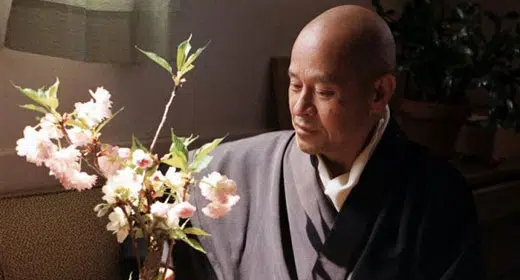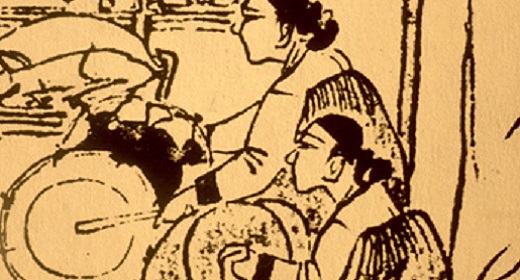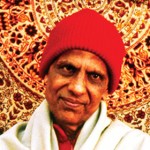Question : For controlling the mind, which of the two is better, performing japa of the ajapa [unspoken] mantra or of omkar [the sound of `om’]?
Ramana Maharshi: What is your idea of unspoken and involuntary japa [ajapa]? Will it be ajapa if you go on repeating with the mouth `soham, soham’ [`I am he, I am he’]? Ajapa really means to know that japa which goes on involuntarily without being uttered through the mouth. Without knowing this real meaning people think that it means repeating with the mouth the words `soham, soham’ hundreds of thousands of times, counting them on the fingers or on a string of beads.
Before beginning a japa breath control is prescribed. That means, first do pranayama [regulating of breath] and then begin repeating the mantra. Pranayama means first closing the mouth, doesn’t it? If, by stopping the breath, the five elements in the body are bound down and controlled, what remains is the real Self. That Self will by itself be repeating always `aham, aham’ [`I, I’]. That is ajapa.
Knowing this, how could that which is repeated by mouth be ajapa? The vision of the real Self which performs japa of its own accord involuntarily and in a never-ending stream, like the flowing down continuously of oil, is ajapa, gayatri and everything. If you know who it is that is doing japa you will know what japa is. If you search and try to find out who it is that is doing japa, that japa itself becomes the Self.
Question : Is there no benefit at all in doing japa with the mouth?
Ramana Maharshi: Who said there is no benefit? Such japa will be the means for chitta suddhi [purifying the mind]. As the japa is done repeatedly the effort ripens and sooner or later leads to the right path. Good or bad, whatever is done never goes to waste. Only the differences and the merits and demerits of each will have to be told, looking to the stage of development of the person concerned.
Question : Is not mental japa better than oral japa?
Ramana Maharshi: Oral japa consists of sounds. The sounds arise from thoughts, for one must think before one expresses the thoughts in words. The thoughts are form the mind. Therefore mental japa is better than oral japa.
Question : Should we not contemplate the japa and repeat it orally also?
Ramana Maharshi: When the japa becomes mental, where is the need for the sounds? Japa, becoming mental, becomes contemplation. Dhyana, contemplation and mental japa are the same. When thoughts cease to be promiscuous and one thought persists to the exclusion of all others, it is said to be contemplation. The object of japa or dhyana is the exclusion of several thoughts and confining oneself to one single thought. Then that thought too vanishes into its source – absolute consciousness. The mind engages in japa and then sinks into its own source.
Question : The mind is said to be from the brain.
Ramana Maharshi: Where is the brain? It is in the body. I say that the body itself is a projection of the mind. You speak of the brain when you think of the body. It is the mind which creates the body, the brain in it and also ascertains that the brain is its seat.
Question : Sri Bhagavan has said that the japa must be traced to its source. Is it not the mind that is meant?
Ramana Maharshi: All these are only the workings of the mind. Japa helps to fix the mind on a single thought. All other thoughts are first subordinated until they disappear. When it becomes mental it is called dhyana. Dhyana is your true nature. It is however called dhyana because it is made with effort. Effort is necessary so long as thoughts are promiscuous. Because you are with other thoughts, you call the continuity of a single thought meditation or dhyana. If that dhyana becomes effortless it will be found to be your real nature.
Question : People give some names to God and say that the name is sacred and that repetitions of the name bestow merit on the individual. Can it be true?
Ramana Maharshi: Why not? You bear a name to which you answer. But your body was not born with that name written on it, nor did it say to anyone that it bore such and such a name. And yet a name is given to you and you answer to that name, because you have identified yourself with the name. Therefore the name signified something and it is not a mere fiction. Similarly, God’s name is effective. Repetition of the name is remembrance of what it signifies. Hence its merit.
Question : While making japa for an hour or more I fall into a state like sleep. On waking up I recollect that my japa has been interrupted. So I try again.
Ramana Maharshi: `Like sleep’, that is right. It is the natural state. Because you are now associated with the ego, you consider that the natural state is something which interrupts your work. So you must have the experience repeated until you realize that it is your natural state. You will then find that japa is extraneous but still it will go on automatically. Your present doubt is due to that false identity, namely of identifying yourself with the mind that does the japa. Japa means clinging to one thought to the exclusion of all other thoughts. That is its purpose. It leads to dhyana which ends in Self-realization or jnana.
Question : How should I carry on japa?
Ramana Maharshi: One should not use the name of God mechanically and superficially without the feeling of devotion.
Question : So mechanical repetition is unproductive?
Ramana Maharshi: Acute diseases will not be cured merely by repeating the name of the medicine but only by drinking the medicine. Similarly, the bonds of birth and death will not cease merely by doing many repetitions of mahavakyas such as `I am Siva’. Instead of wandering about repeating `I am the supreme’, abide as the supreme yourself. The misery of birth and death will not cease by vocally repeating countless times `I am that’, but only by abiding as that.
From David Godman Excellent Book “Be As You are”









































